Author: Susan George
Jane Robertson • Mission & Peace Committee Member
May 1, 2025Editor’s Note: On the first Thursday of each month, the eNews feature article highlights the mission focus for the month. In May we’re lifting up the Pentecost Offering of the Presbyterian Church (USA).
Children are the focus of this year’s Pentecost Offering. The aim is to encourage and develop young people’s faith, provide resources for their spiritual formation, and support youth ministry efforts. Sixty percent of this offering goes to PC(USA) initiatives designed to support and nurture young adult volunteers, youth ministries, and at-risk kids. The remaining 40% stays in our local area. The Mission and Peace Committee has selected Joshua Group’s Summer Learning Camp to be the recipient of this year’s offering.
The mission of the Joshua Group is to provide hope and support to low income, at-risk youth through educational and vocational opportunities. The organization offers an after-school program, a preschool program, a kindergarten program, and a tuition scholarship program and a Summer Learning Camp in Harrisburg’s Allison Hill neighborhood. Derry has been a supporter of the Joshua Group for over 20 years.
Research demonstrates that students from low-income families suffer significantly greater learning losses over the course of the summer as compared to students from more affluent families. Sustained summer losses can have a cumulative negative effect on student achievement due to widening educational gaps. These gaps may, in turn, lead to higher dropout rates. To stem that loss of learning, the Joshua Group offers a Summer Learning Camp. Children entering grades 1-9 will be participating in the seven-week camp, free of charge.
Qualified staff and volunteers serve as teachers. Older high school students who have participated in the Joshua Group’s After-School program are hired to serve as mentors and role models. Many of these high school students include this meaningful work experience on the resumes and college applications.
Kids learn best when routines and procedures are clearly established. Activities are carefully planned to ensure that learning is effective, fun, and meet the learning needs of each camper. On Monday through Thursday, the focus is on academic activities such as reading, writing, and math. Fun Friday includes field trips and other special events. Many activities are led by partnering organizations such as Dauphin County Library System, the Central PA Food Bank, Girl Scouts, Recycle Bicycle, and others. Cooking classes, nutrition education, music education, art education, and yoga are just a few of the enrichment classes offered.
Adults often ask kids how they plan to spend their summer. This summer there are 145 kids living in Allison Hill who are excited to be attending Summer Learning Camp.
To give online to the Pentecost Offering, click here. You can also write checks to Derry Church notated “Pentecost Offering” or use the designated envelopes available in pew racks through June 8. Place checks and envelopes in one of the offering boxes or bring them to the church office.
Thanks, Derry, for giving to the Pentecost Offering.
Bobbie Atkinson • Heritage Committee Member and Elder
April 24, 2025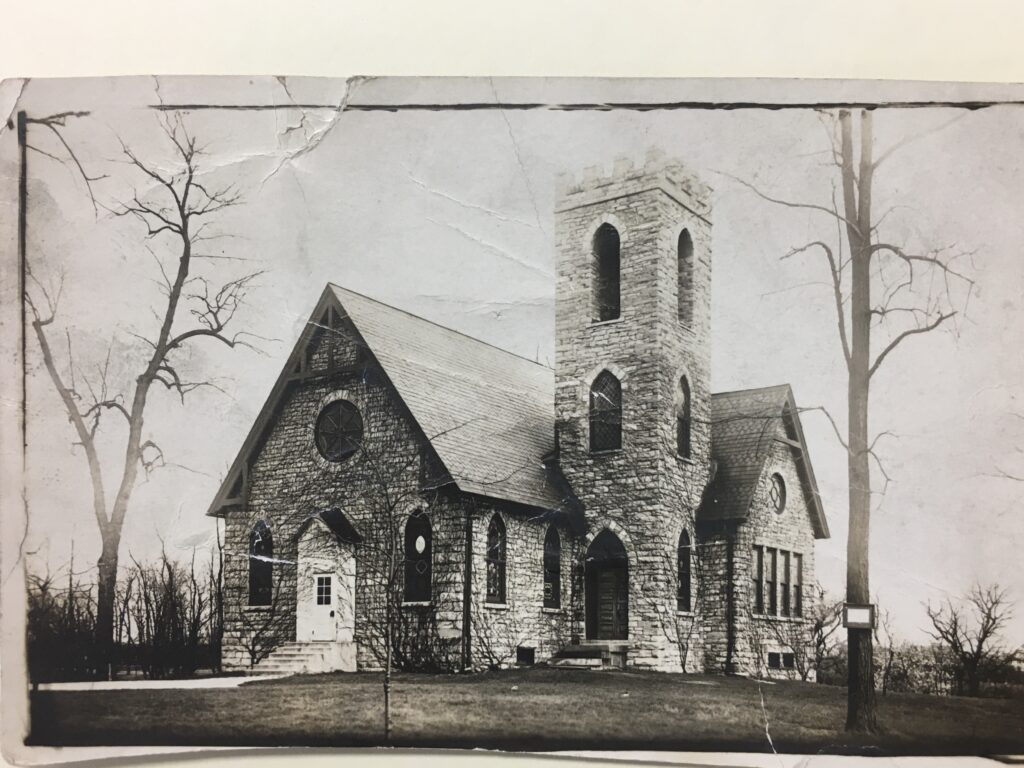
When Milton Hershey returned to the Derry area in 1903 to build his chocolate factory and establish a model industrial town, church membership began to grow. In 1909 Derry was able to call its first pastor since 1874, Reverend C. Benjamin Segelken. The Pastor provided important leadership and significant changes occurred during his one year pastorate. A choir was organized, a pianist hired and the Ladies Guild was established. Reverend Segelken was succeeded by Reverend George Rentz. The congregation continued to slowly expand and in the mid-1920s the Session and Trustees began discussing plans to expand the Chapel.
In the midst of making these plans to add more classrooms and space for fellowship, Derry’s pastor, Reverend Robert Taylor, received a letter from Charles Seibert Losh of Midmer-Losh Incorporated Pipe Organs offering a pipe organ that he had built in 1926 for Thomas Edison’s West Orange, New Jersey recording studio. During the 1920s, organ music had become very popular but good recordings were difficult to create. The heavy bass pipe frequencies seemed to distort the recording process. Edison was experimenting with various types of organs and Midmer-Losh organs seemed to give him the best results.
The Midmer-Losh organ offered to Derry Church was specially built for Edison’s recording studio. It was an eight-rank, three-manual symphonic organ that could be used to play popular music, as well as classical and sacred music. It had a seven-octave Choir keyboard with 12 extra keys in bass and treble which allowed the organist to play pedal tones on a manual key with fingers rather than using the foot pedals, thus simplifying the organist’s work. Also, Losh was very interested in creating synthetic tones that he called “unification.” Pipe organs have very pure fundamental tones but harmonic tones are more appealing to the human ear. Losh’s organ had a set of pipes creating fundamental tones but he also had some of those same pipes sound also by electrical connection or unification creating harmonics that added strength and color to the tone. Thus, he was able to get more perfect and beautiful tones from his instrument.
The Edison recording studio closed in 1928. Mr. Losh purchased the organ from Edison and, according to his letter, had previously talked with Reverend Taylor about the church acquiring this organ. His sale price was $3,000. Losh offered to install it and promised it would be “ready for use” on or before August 15 of that year. Derry decided not to accept that offer, probably because the church was still financing other building projects including repairs to the cemetery wall (1922) and the construction of the manse (1924). Any future consideration was delayed with the onset of the Great Depression in 1929.
Even though Derry Church declined Mr. Losh’s offer, Mr. Losh and his wife, Esther Johnston of Cornwall, and his young son, Samuel, moved to Hershey after he retired from the Midmer-Losh company. They moved into the old United Brethren Church (now the First United Methodist Church) at 333 Park Avenue that was renovated as a residence and organ workshop. The Edison studio organ was installed in their new home. All this was made possible because the Methodist Church hired Mr. Losh to install a new organ in the church’s new building on Chocolate Avenue. Mr. Losh received the old building at 333 Park Avenue and one dollar as payment. Mr. Losh died in January, 1934 but his wife continued to live on Park Avenue until 1962 when she relocated to Reading.
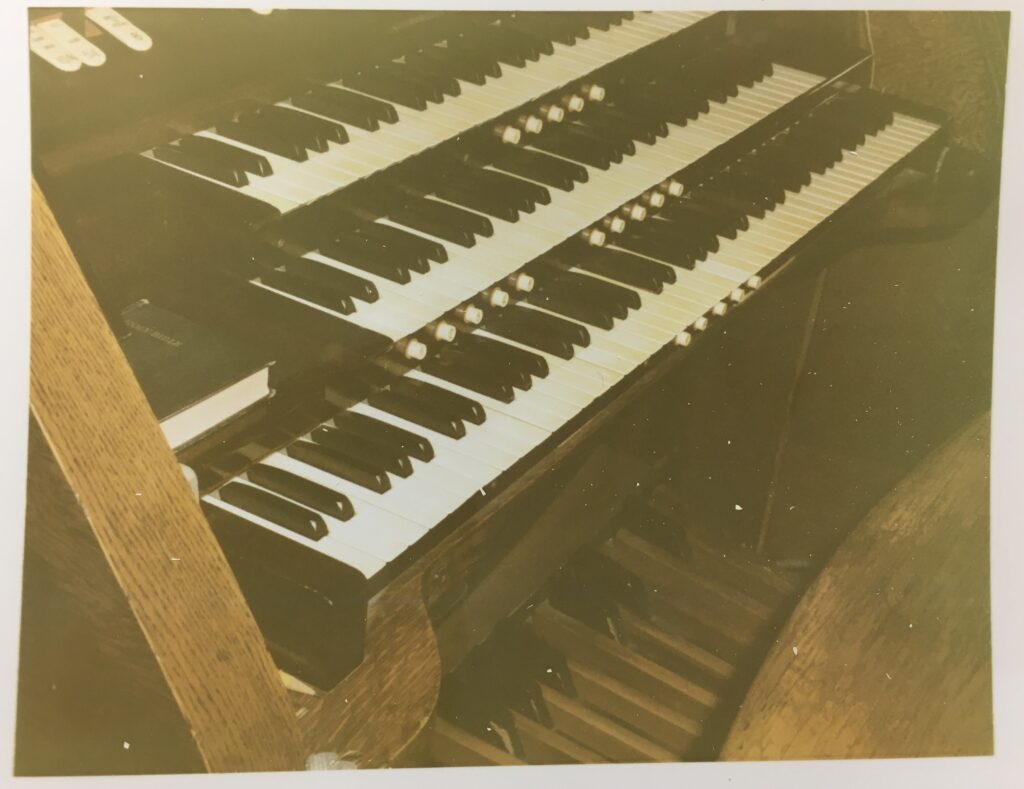
In 1933 Derry Church was again approached by Mr. Losh’s wife. She offered to sell the Edison organ for $1,500. By then Derry Church had revived its plans to expand the Chapel. In the church archives, there is a letter between Reverend John Corbin (then the current pastor), and the architectural firm developing plans for the expansion, to confirm that the organ installation would not affect any future plans to enlarge the Chapel.
Derry Church agreed to purchase the organ and Mr. Losh installed the organ in the Chapel. The pipes were installed above the west transept. The organ was first played on August 19, 1933. The following week a formal recital by Paul Allwardt, an up-and- coming organist at Union Theological Seminary, New York, was held on August 24.
The Chapel organ created opportunities for Derry to host organ concerts by noted organists. Clarence Kohlmann, organist at The Auditorium in Ocean Grove, New Jersey, presented a recital in the Chapel on October 5. The program included favorite numbers climaxing with “The Creation” and “The Storm” which were featured selections at Ocean Grove every afternoon during the summer months.
The organ was formally dedicated on October 26, 1933 with the Reverend John C. Corbin officiating. Reverend Dr. Walter W. Edge, pastor at the First Presbyterian Church, Lancaster, presented the sermon. Mrs. H.H. Rhodes, organist at Middletown (PA) Presbyterian Church, was guest organist.
This organ provided music for worship until the Sanctuary was built in 1966. By that time, serious repairs were needed but were not completed. The organ was removed from the Chapel in the mid-1970s.
Click here to listen to a recording of the Edison Studio Midmer-Losh organ.
Rev. Nancy Joiner Reinert • Retired Presbyterian Church (USA) Pastor
April 17, 2025Jesus:
challenged, threatened, trapped
misunderstood and mistreated
interrogated and ridiculed
Betrayed
Denied, abandoned, arrested, convicted
Jesus was taunted, ridiculed, mocked
spat upon, stripped, whipped
all without defending himself
Crucified
While the earth turned dark
and the Temple curtain tore
he gave up his life.
Dead and Buried
Friends rescued his bruised body
from the ugly cross
wrapped it in linen
and laid it in a garden tomb
And us with him, our pain, our doubts
our messes —
misunderstandings, conflicts,
denials, challenges, betrayals, unbelief
fear, anger, hurt, failures
Sealed in the dark tomb
Hidden from the Light to turn to ashes
And on the third day
Light poured into the empty tomb
The power of Death –
and our daily little deaths –
defeated
Christ is risen!
Word in flesh
And we are born into the Light
Forgiven
Transformed
Eternally
Love empowered
Easter People
Piper Stagg • Derry Member
April 10, 2025Dear Derry Family,
As a recipient of the Derry Youth Servant Leadership Scholarship, I wanted to share an update on how the scholarship has gone towards my education. I am enrolled at the University of New England in Biddeford, Maine, and I am in my sophomore year.
As a freshman, I began pursuing degrees in Marine Science and Outdoor Business & Innovation. I am a member of the newly established Plankton Ecology Lab, led by Professor Trica Thibodeau. Through the fall and spring, I was part of a team that analyzed data on the abundance of copepods, a type of zooplankton, in an Oxygen Minimum Zone in the southeastern Pacific Ocean to understand better how the food webs in the area will change as the Oxygen Minimum Zone expands. We presented our findings at the University’s spring research symposium. I made the Dean’s List for both the fall and spring semesters.
This year I am continuing my work in the Plankton Ecology Lab, and my research will be focused on cataloging and identifying the species of plankton that live in the waters of the Saco River and nearby Saco Bay. I will continue exploring these waters during my free time as I become SCUBA certified through the university’s SCUBA Club. I am joining the team of Student Ambassadors and I will be facilitating tours for prospective students and families.
I am grateful for the opportunity to pursue my education at UNE, which was made possible in part by the Brong Scholarship. If anyone from the Derry family is ever in Maine, please don’t hesitate to reach out!
Julie Wetzel • Fundraising/Marketing Manager, Love INC of Greater Hershey
April 3, 2025Editor’s Note: On the first Thursday of each month, the eNews feature article highlights the mission focus for the month. In April we’re lifting up community involvement.
Love INC of Greater Hershey serves as a vital beacon of hope and practical support for individuals and families facing hardship in our community. Through a network of local churches, including Derry Church, Love INC acts as a bridge, connecting those in need with essential resources and compassionate assistance. Going beyond simple referrals, Love INC cultivates genuine relationships, offering personalized support that addresses the root causes of challenges. From providing basic necessities like toiletries and household cleaning supplies to tackling complex issues such as housing and financial instability, Love INC’s holistic approach empowers individuals toward lasting self-sufficiency.
We are so thankful for your continued support of our ministries. Love INC significantly impacted our community in 2024, serving over 500 families and providing $566K worth of services on a $279K budget, with the support of 6,350 volunteer hours. Our office is located in the Derry Church’s Mission House, which is the hub for our Connection Center and Personal Care Closet Ministry. We are also thankful for the many volunteers from Derry Church who serve in various capacities. Derry members can be found working the phones in our Connection Center, helping at one of the Parsonages, packing bags in the Personal Care Closet, providing support to families in our Homes of Hope Program, volunteering for our annual 5K Race, and donating Auction items, personal care items and sneakers throughout the year.
Love INC has several urgent volunteer needs:
- Parsonage Ministry needs both House Managers and Housekeepers for weekly shifts. These shifts are flexible hours.
- The Connection Center (office) is seeking to add two individuals with compassionate listening skills, who are comfortable using a computer to serve weekly in reception and/or intake roles.
- Volunteers are needed for the planning team for the annual 5K race in June.
Interested individuals can contact the office at 717-835-0101 or email Michelle Miduri.
Love INC appreciates Derry member Teresa Hutcheson’s service on the Board of Directors and her long-time commitment to our ministries, particularly her passion for the Personal Care Closet. With Teresa’s recent resignation, Love INC is seeking a new Board member. The Board meets the third Thursday of each month at Derry Church. Members are encouraged to be active in ministries and special events as they are able. Recommendation and inquiries can be directed to Dale Forshey, Love INC’s Executive Director.
Thank you for making a difference in the lives of our neighbors in need!
Rev. Stephen McKinney-Whitaker • Pastor
March 27, 2025I’m excited to announce that next year — March 7-14, 2026 — Derry Church will sponsor a trip south to explore the roots of the Civil Rights Movement. Participants will travel from Atlanta to Memphis, with stops in Montgomery, Birmingham, and Selma, to learn about those who fought for civil rights in that turbulent time.
The tragedies and triumphs that took place during the Movement in the 1950s and 1960s awakened an entire nation to the reality of racial injustice African-Americans faced nationwide. In that era, African-Americans fought to gain equal rights in the United States and were met with resistance, and often violence. We can learn from their struggles, their successes, and their perseverance, but also from the mistakes and abuses perpetrated by the nation, the church, and individual Christians so we do not make similar mistakes in the future.
In order to better understand the Civil Rights Movement, we need to walk through the places where it happened and learn from those who shaped it. So we are partnering with Dr. Todd Allen of Messiah University, who has developed relationships with veterans and scholars of the Civil Rights Movements over the 25 years he’s been leading these tours. Click here to watch a 30-minute documentary about a past trip.
Dr. Allen says,
The fight for civil rights in America spanned decades and locations. During this journey participants will visit many of the key Southern sites of the freedom struggle and along the way engage with veterans of the Movement hearing first hand their testimonies of what it means to stand up for freedom, justice, and equality then and now.
Lynn George, daughter of Sue and Jim George, joined Dr. Allen on a 2023 bus tour and had this to say:
Travel always expands your world, but this trip makes history come alive. I thought I knew the history of the civil rights era, but this pilgrimage opened my eyes to the realities of living and fighting for the rights I take for granted every day. Not only do you walk in the footsteps of civil rights leaders, but you visit historical sites and meet with civil rights leaders as they tell their stories. This is not an easy, vacation-style trip: this adventure will rock you to your core and make you realize that everyone has a role to play in fighting against injustice.
My hope is that we will gather a diverse group of Derry travelers that spans the generations. I believe this trip will be an eye-opening, sobering, but ultimately hopeful and life-giving journey that will inspire us to continue to proclaim God’s word, share God’s love, and practice God’s justice.
If you would like to experience and explore the roots of the Civil Rights Movement, let me know. I will keep a list and share updates, itineraries, cost, and how to sign up for the trip later this year.
Pam Whitenack • Derry Member
March 20, 2025While today the role of women as leaders in the church is not questioned or challenged (at least not at Derry Church or the PCUSA), it wasn’t until the early 20th century that the Presbyterian Church began taking steps to recognize the rights and benefits of including women in leadership roles.
The development of Presbyterian female leadership followed trends in the United States. In August 1920, Presbyterian President Woodrow Wilson signed into existence the 19th Amendment to the Constitution of the United States granting women the right to vote. As women were gaining ground in public matters, they gained ground in ecclesiastical affairs.
During the 19th century women had established organizations apart from men. Women became deeply involved in the support of and participation in educational endeavors such as Sunday Schools, and home and foreign mission work. They formed their own societies to further causes that interested them. At Derry, one of the Presbyterian church’s oldest women’s missionary societies was established in 1838.
For Derry Church, women also played a critical role in the construction of the Chapel in 1884. It was largely due to the efforts of two women that our Chapel was erected. Mrs. Charles Bailey of Harrisburg, a descendant of one of the original founders, became interested in reviving the church at Derry. She succeeded in interesting Mrs. Dawson Coleman, of Lebanon, in this goal. Given the fact that Derry Church had only six or seven members and no pastor, this was a bold undertaking. They sought no recognition and their efforts and leadership for this project were hidden to history by the public records signed by their male counterparts.
While they might not have had the opportunity to serve as Elders, Deacons, or Trustees, Derry’s women’s groups played important roles supporting and funding the church. Women also led the way in promoting and funding various mission projects.
The Ladies’ Guild, established in 1909, played a significant role in Derry Church life. In addition to Bible studies and fellowship, fundraising played an important role in the Guild. During the Guild’s first ten years, these women raised funds to improve the Chapel building. Fundraisers were often held in downtown Hershey because there wasn’t space for such events in the Chapel. The women held strawberry festivals and oyster dinners, sold magazines such as McCall’s and Ladies’ Home Journal, sewed and sold aprons, and even offered weekly embroidery and crochet lessons to add to their treasury. With their funds, the women paid for pews in the Chapel, repaired the church walls ($150), tuned the Chapel piano, purchased a Brussels carpet ($263.75) and the church’s first electric vacuum cleaner ($20.38). In 1917, the Ladies’ Guild paid for Derry Church’s first indoor toilet.
The Women’s Missionary Society offered mission study classes. Each month was devoted to studying a particular group or issue, such as migrants or China, to raise awareness of the worldwide need for financial support. These efforts encouraged Derry’s interest and commitment to supporting mission work.
The Presbyterian Church first granted the right of women to serve as “brother deacons” (as they were called) in 1922-23, and “brother elders” in 1930. Many churches, Derry included, were slow to recognize the value of including women in leadership roles in the church.
Derry Church ordained its first women as deacons in 1957. That year Ruth Hoffer and Alma (Mrs. James E.) Bobb were elected to Derry’s Board of Deacons. They would be the first and last women elected to one of Derry’s Boards until 1971. There are many possible reasons. The pastor who had encouraged the inclusion of women in 1957 took another call in 1959, and Derry’s next pastor, Reverend Ira Reed, faced many challenges when he first arrived: building a new sanctuary, confronting growing social unrest regarding civil rights for women and people of color, the VietNam war, and significant social change. But throughout the 1960s, the topic of women serving as Elders and Deacons was under consideration by Session and the congregation in general.
In 1969, when the Nominating Committee was seeking candidates for various church offices, the committee discussed whether women should serve as officers. While the committee did not nominate any women to the Boards for 1970, early that year Clara Owens, a member of the Nominating Committee, conducted an informal survey with the question: “What do you think of having women as officers of the church?”
The responses were published in the February 1970 church newsletter. Some of the responses:
“Why not?”
“I can see them serving as Deacons and Trustees, but to as Elders. I feel that the position of Elder should filled by a man.”
“I see no reason why women should not serve in an official capacity in the work of the church if they are qualified. Everyone should commit themselves fully to the work of the church.”
“Whether a church officer is a man or woman is not important. It is the fact that the person have the spiritual qualities and good sense that God would want a church officer to have that is important.”
“Women are active in other areas of the church and should therefore serve as officers.”
“It is a good idea, but they should not be in the majority on any of the boards.”
“Women are as qualified as men and sometimes they have more time to get to the meetings at church.”
“I am a fence sitter and have thought about this for many years. Women definitely have their responsibilities in the work of the church, but I am not certain that one of their responsibilities is as Elder. If women are to take their place as members of the Boards, I do feel that there should be two on each Board, not just one.”
These responses encouraged the 1971 Nominating Committee to include one woman, Josephine Baum, to be elected to the Session. The following year, Clara Owens was ordained as an Elder and in 1973, two women were elected to the Session. Since that time, women have been elected to each class of Elders and Deacons.
Dan Dorty • Director of Music and Organist
March 13, 2025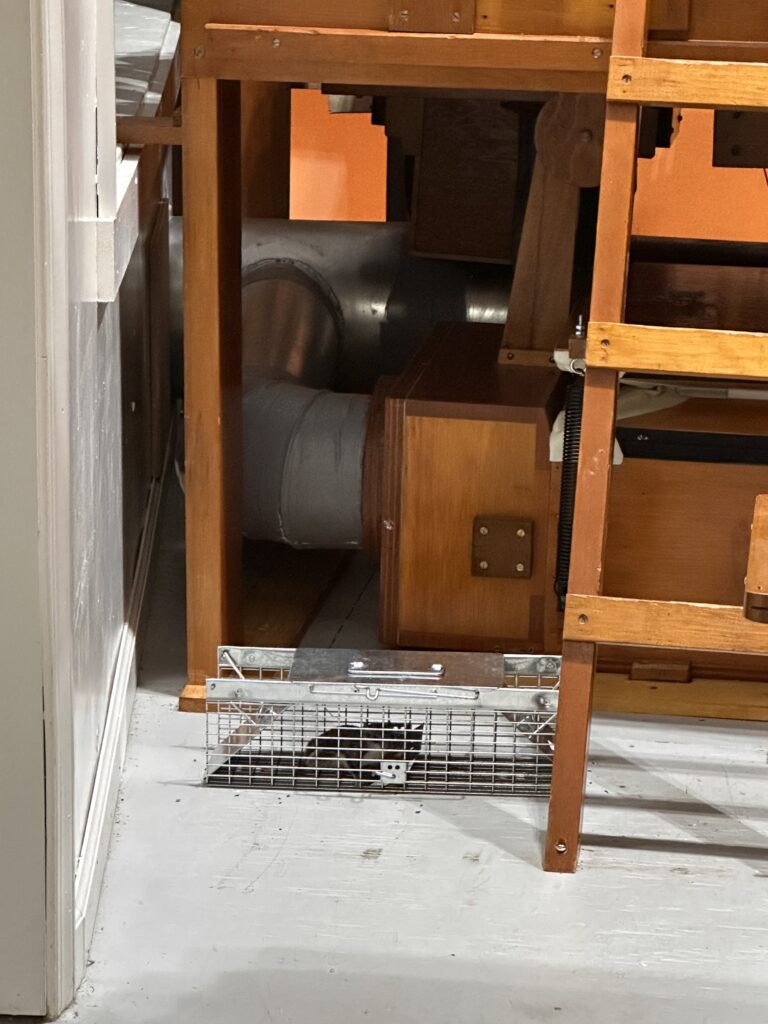
We’ve all heard of bats in the belfry, but have you ever heard of squirrels in the organ? In November and December last year, we discovered that a couple of adolescent squirrels had made their way into our building and found plenty of places to hide their winter acorn stores among the 2,795 pipes of our Aeolian-Skinner pipe organ. With the help of Shawn Bentley, the squirrels have now been rehomed and returned to the trees to roam freely.
These fluffy-tailed creatures are known for hiding acorns in organ pipes, chewing on metal pipework like a tin can, severing wiring, and enjoying the Italian leather that seals the corners of the bellows. As you can imagine, I was concerned about the potential damage that might have occurred during their stay. In conjunction with the infestation, I noticed that the organ was losing air, especially when it was played with all the stops engaged. This indicated that there were significant leaks within the instrument. There were numerous possibilities for these leaks, including the wind lines, wind chests (where the pipes sit), bellows, or even the blower itself.
Nicholas Thompson-Allen and his team arrived in Derry last Monday to assess the damage to the instrument. Fortunately, our worst fears—that squirrels had caused extensive damage—were unrealized. The bellows, pipes, wind lines, and wind chests showed no signs of gnawing. However, we were still left wondering about the source of a massive air leak.
After hours of searching the organ chambers, Nick eventually identified the leak beneath the floorboards of the chamber. On Tuesday morning, the team cut into the floor and discovered a displaced large rubber gasket on the main wind line. This gasket had been dislodged for many years and worsened recently due to deterioration. This deterioration likely dates back to when the Reuter organ was still in use here at Derry. After installing a new gasket and ensuring everything was in proper working order, our majestic instrument is now functioning beautifully, playing better than it ever has during its time here at Derry. My deepest gratitude goes to Shawn Bentley, Nicholas Thompson-Allen, and the entire team. Our magnificent instrument now sings with all its might and grandeur.
Kristen Campbell • Derry Member
March 6, 2025Editor’s Note: On the first Thursday of each month, the eNews feature article highlights the mission focus for the month. In March we’re lifting up the One Great Hour of Sharing offering.
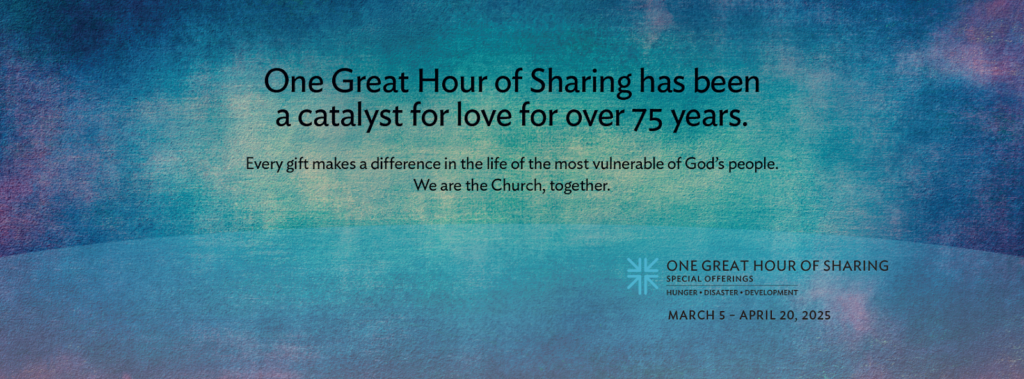
As we enter the season of Lent, Derry Church invites you to take part in the One Great Hour of Sharing Offering, a tradition of generosity that continues through Easter Sunday, April 20.
Last year, thanks to the incredible generosity of our congregation, we surpassed our goal of $19,000. This year, we are setting our sights even higher, with a goal of $22,000.
Your contributions will be divided equally:
- 50% will support the Presbyterian Church (USA) through three vital programs:
- Presbyterian Disaster Assistance provides emergency relief and rebuilding communities affected by natural disasters.
- Presbyterian Hunger Program addresses food insecurity and supports sustainable solutions to end hunger.
- Self-Development of People empowers communities through economic initiatives and self-sufficiency programs.
- 50% will go to Bridges to Community, Derry’s mission partner in the Dominican Republic, where we’ll send a team in June to build a home for a family in need. This will be the 41st home built by Derry Church since the first trip to Nicaragua in 2001.
One Great Hour of Sharing (OGHS) brings hope and relief to those facing hardship, especially in today’s challenging environment, where rising food and shelter costs, along with job losses, are making it harder for many to meet their basic needs.
You can find OGHS envelopes in the pew racks or give online. Every gift, no matter the size, makes a meaningful difference.
Together, let’s make 2025 another year of generosity and impact.
Sandy Morales • Derry Member
February 27, 2025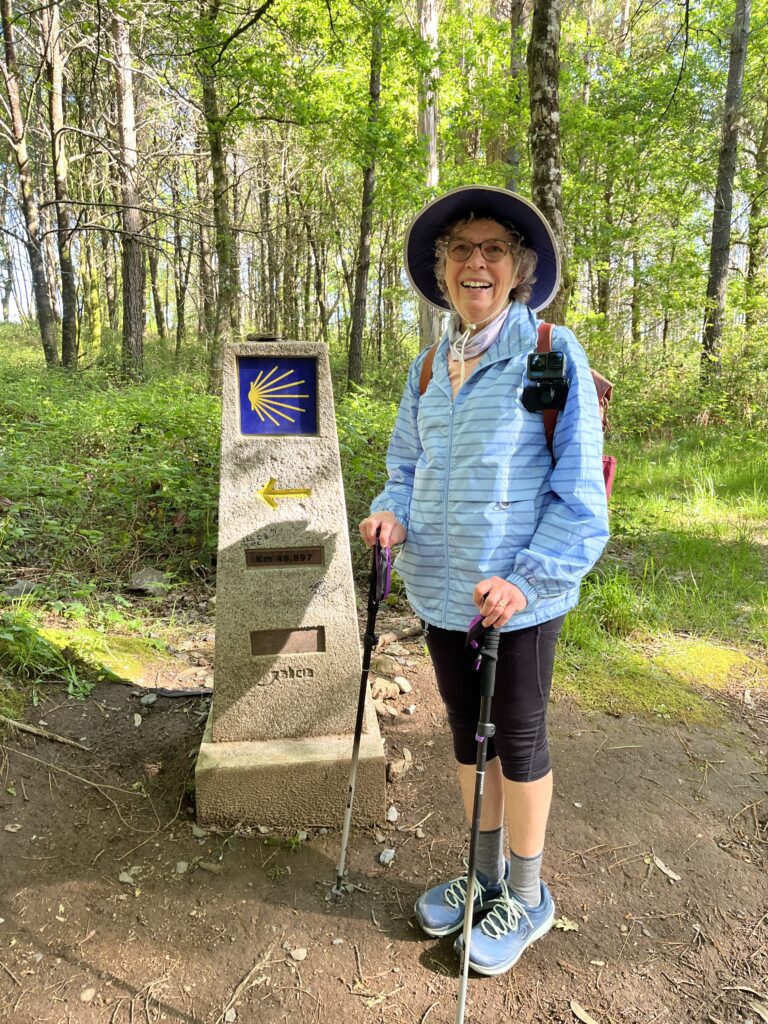
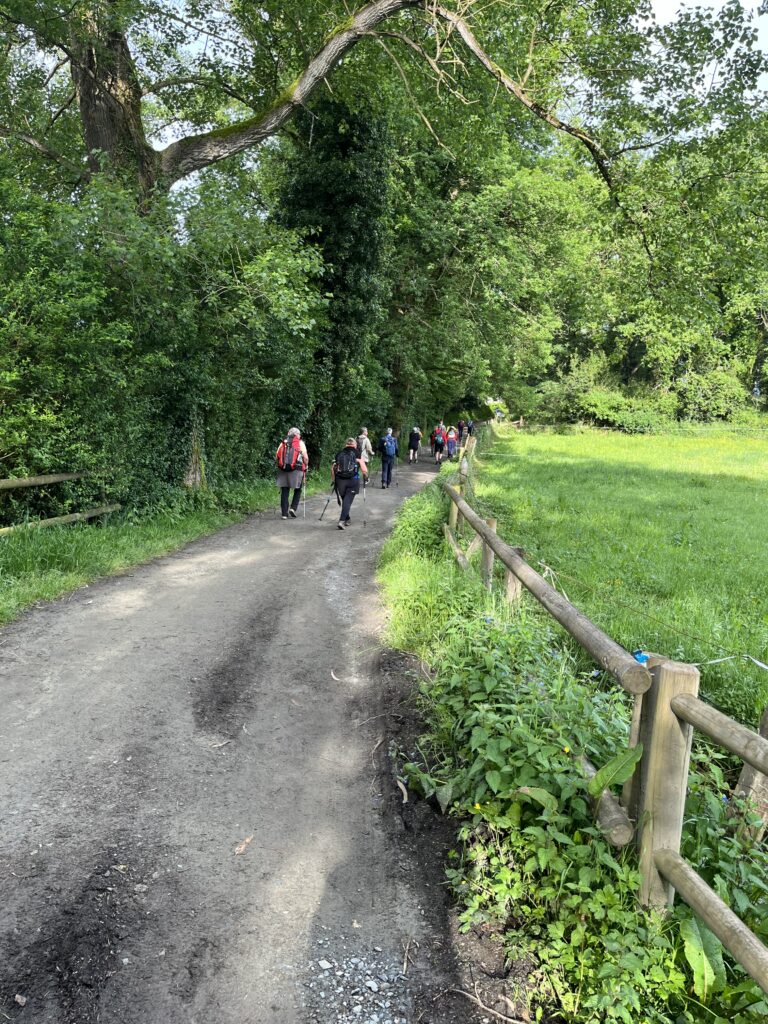
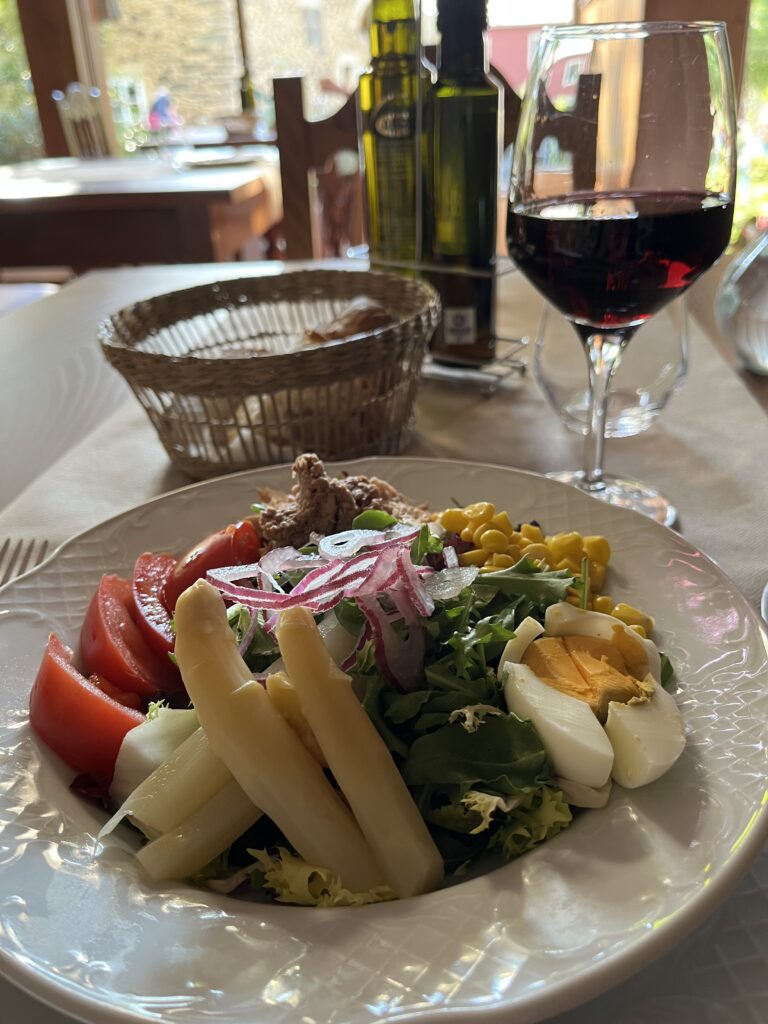
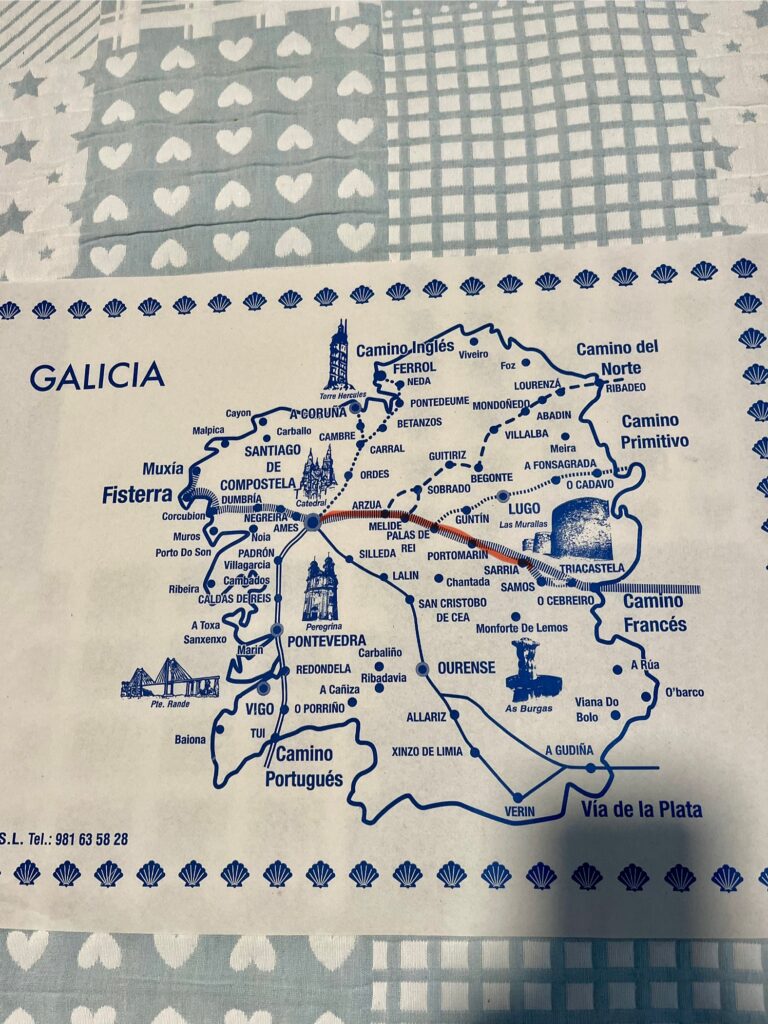
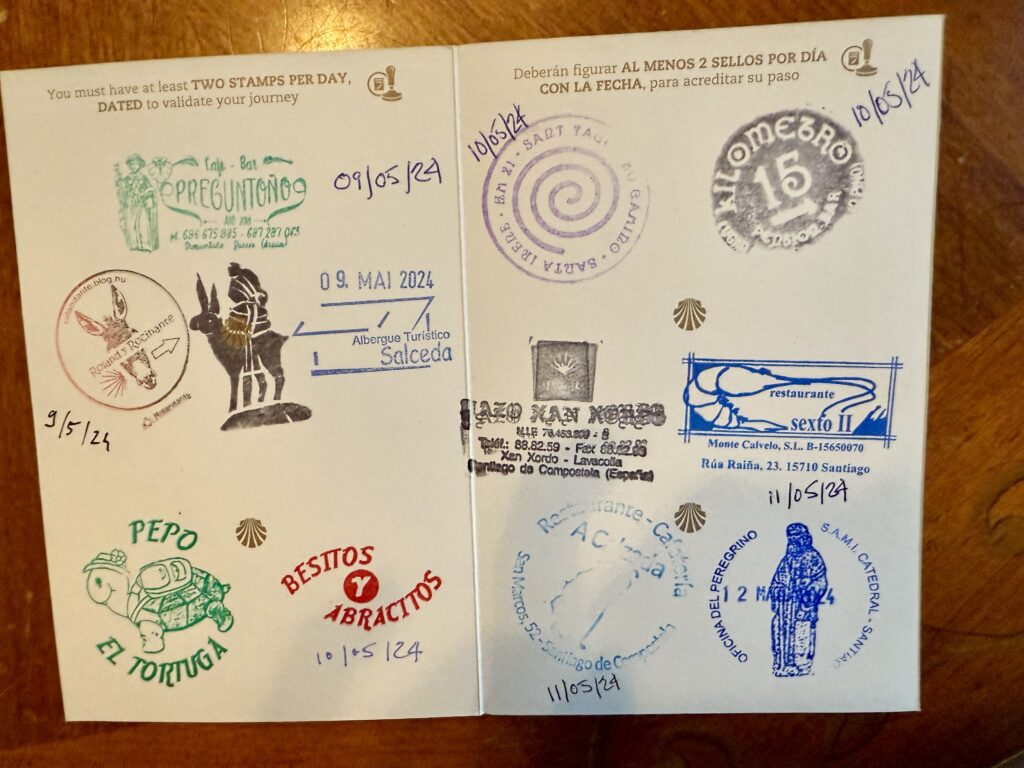
For ten years I had wanted to walk the Camino de Santiago in northwestern Spain. Last year, in celebration of a milestone birthday, I made the commitment and put my training plans in place.
The Camino de Santiago, or the Way of St. James, is a network of ancient pilgrim routes leading to the shrine of the apostle Saint James in the Cathedral of Santiago de Compostela. The pilgrimage has existed for over 1,000 years.
Traditionally pilgrims began their journey from their home, so there are many routes across Europe. Today’s pilgrims walk or bike the Camino for a variety of reasons: for many it’s a religious and deeply spiritual experience, for others it’s a challenging physical and mental test, and others enjoy immersing themselves in Spanish history, nature, and cuisine. Distances vary, but in order to earn the compostela — certificate of accomplishment — a pilgrim must walk at least 100 km. Pilgrims carry a passport and must collect at least two stamps a day as proof to the Pilgrim’s Office in Santiago that they have followed the route. I chose to walk a portion of the most popular route, the Camino Frances, from the town of Sarria to Santiago.
My eight-day walk was definitely the experience of a lifetime. The friend who had planned to join me on the journey became ill a month before the trip and needed to cancel. This meant that I travelled solo, which was a daunting prospect at the onset. Quite a few people that I talked with, though, commented that walking the Camino solo is the best way to do it, and they assured me that by the end of my journey I would have a new “familia.” I found this to be true and it was probably the most rewarding aspect of my Camino experience.
I met people from all over the world. We were simply pilgrims with no history or expectations of each other. There was a very strong feeling of community. You develop relationships on the Camino in a very unique way: you might walk with a person for a couple hours or have a meal with someone, share contact info, and then part ways, not thinking you’ll ever see this person again. Several days later you will meet up again either walking or having a café con leche along the way.
This brings me to my most important take-away from the Camino. I felt God’s presence with me every step of the way through my journey. I never felt that I was alone, even when I walked by myself for a couple hours. (There are guideposts all along the way with the yellow and blue scallop shell that is the symbol of the Camino pointing you in the right direction.) What started for me as a way of celebrating a milestone birthday became a journey of gratitude. I felt God’s presence in the beauty I saw in nature, in the physical strength and stamina I felt in my own body, and in my conversation, laughter, and shared stories with my neighbors from around the world. When I arrived in the plaza in front of the Cathedral in Santiago it was with tears of joy and gratitude.
I am now training for my second Camino, the Portuguese Camino, in May. If you are considering walking the Camino, I have recommendations for gear to bring with you, training, and how to plan your route and accommodations. You can contact me at smorales@email.com.
Amanda Bentley • Hospitality Coordinator
February 20, 2025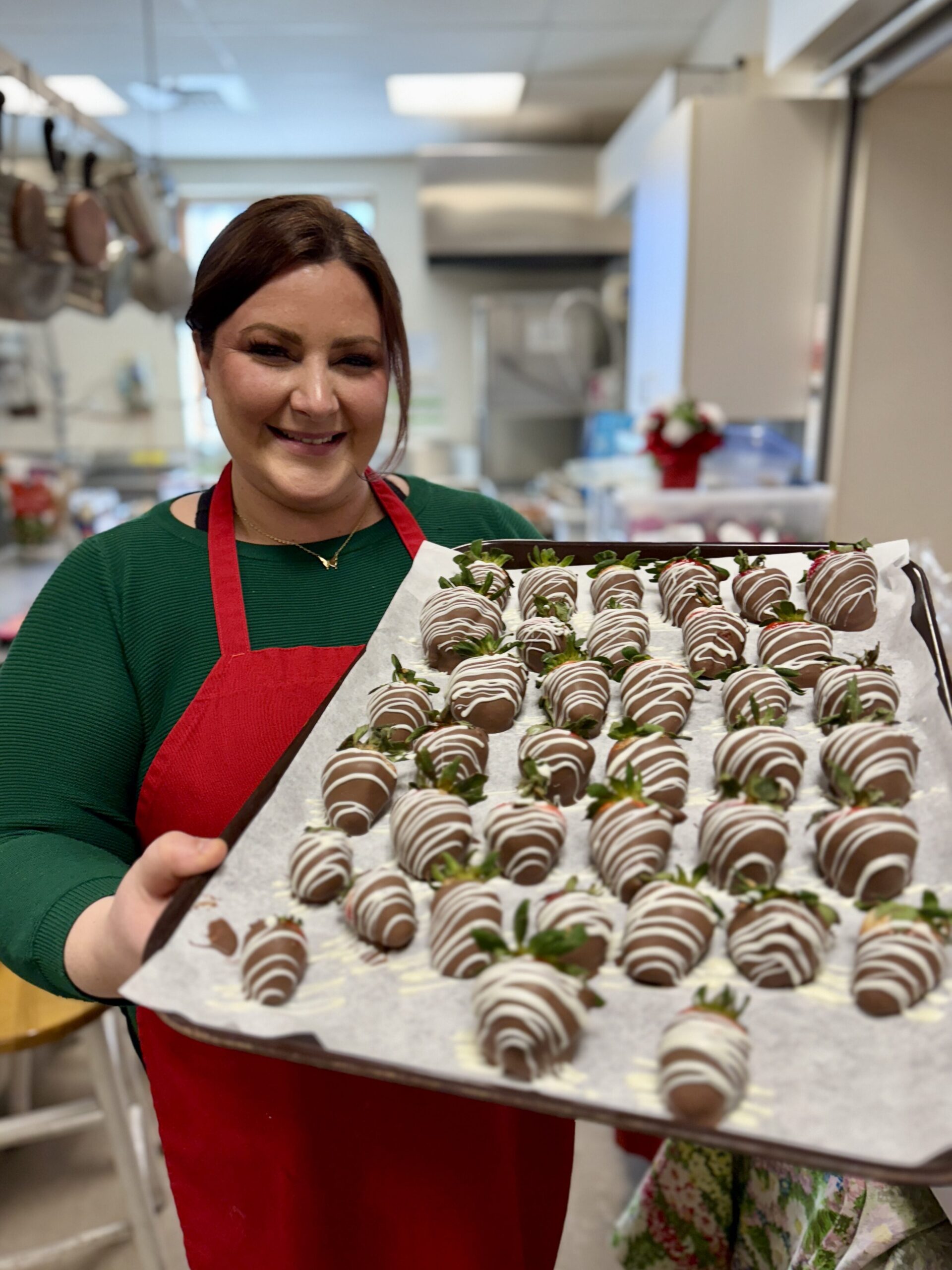
My name is Amanda Bentley. I am 36, a wife, a mother of two boys, (and two bonus boys!), and the oldest of four children. I owned my own bakery business for over 15 years, and have been working in the hospitality industry for over 20 years. I served and bartended for many of those years, and was very fortunate to be able to be home with my kiddos as they were growing up. I am also starting a women’s cooking class/bible study in my home starting in the spring, and really looking forward to what God has for us there.
My passion for baking came from a love for art, which I absolutely loved in school. Baking in itself was never my true passion, it was the art side that I craved. As I had children, I thought it would be awesome to be able to do their birthday cakes for them. And that’s where it all began. I started with cupcakes, and then worked my way up. Soon, I had more than just friends and family wanting desserts, so I decided to branch out, and 15 years later I am still creating.
Working in the professional field of hospitality for many years has been a highlight for me. I have also come to realize how much I love cooking, over baking. The love for food (and the occasional wine pairing!) has grown exponentially. I remember when I first started, my palette wasn’t exactly “adult like”. But getting to work beside some brilliant chefs, and gaining knowledge from them, has been a true gift. It made me realize not how much I just love food, and creating new dishes, but being able to serve others in the process, is what makes what I do, so much more heartfelt. Food is a connection point for all.
I am so thankful to be a part of Derry Church. I am coming to familiarize myself with everyone, coming up with new systems, and settling in nicely. Terrific Tuesdays are truly one of the highlights of my week. I always look forward to seeing everyone’s faces, some who I don’t get to see most of the week. There are many ideas that I have stirring up in my head, of events that I would like to do and make happen. One that we are moving forward with is a movie night! Also, working with Sue, we are going to start a new cooking series, which will range from super easy appetizers to a hearty, soul filling dinner, to sandwich ideas, to desserts! As we progress into the year, my hopes would be to provide everyone with healthier options for snacking, along with our terrific Tuesday dinners, and post worship fellowship.
If you ever have any questions, please feel free to reach out to me. Feeling very blessed to be able to serve such a wonderful group of people. Be blessed.
Rev. Shawn Gray • Associate Pastor of Christian Education
February 13, 2025Over the years of working at churches, I have been seen as the elusive young adult and have been asked to speak on behalf of all young adults. When I have interviewed for various positions in churches, there is one question that always comes up. This question even came up when I was being examined on the floor of Presbytery during my ordination. I was asked, “What can we do to get young adults to come to church?” At Presbytery I prefaced my answer with, “I don’t believe I should speak on behalf of all Millennials” but then I said, “There is no silver bullet.” I encouraged churches to ponder “Why do you want them here?” If pushed, I would explain that service and passion are often what drives young adult engagement.
The original understanding of church engagement has been:
- Visit a worship service
- Start attending regularly
- Become a member
- Serve on a committee
- Engage in service.
With millennials and younger generations, this pattern flips upside down. Young people begin participating with service projects that align with their values and passion. Service comes first. Then through relationships, they may begin to come to the worship service, or will be happy to share about the service project they are engaging in with the church in an effort to garner support. Membership may or may not ever happen, but if it does, it’s the last thing.
Pew Research shows that 18-39 year olds attend church less than their 40+ counterparts. Only 28% of 18-39 year olds attend church regularly, whereas 40% of 40+ year olds attend church regularly I have found younger generations do not like to sign the attendance book on Sundays, are not interested in membership, and may attend on a semi-regular basis but have a strong resistance to committing to join the organization. The response from faithful church members is often, “They should come.” I believe our task as the church is to examine how we, as a church body, exemplify the values and passions that matter to these younger generations. Instead of asking them to conform to what the church is, how can the church participate in missional opportunities that parallel what these generations care about? Is there anything that turns these young people away from the church?
This is the meaningful and challenging work of engaging with young generations. Simply existing is not enough to persuade these younger folk to attend church. We need to listen to how they see the church, then offer to partner with them in the ways that both support the church’s mission and the passion of these generations.